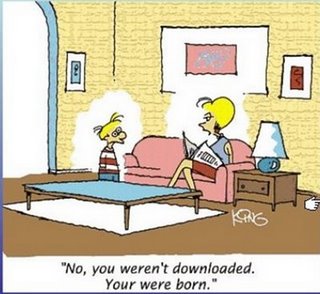E-learning concepts - Table of Content
Net Generation
 Learning Objectives
Learning Objectives
When you have completed this session, you should be able to
- to understand why there is such intensive research into understanding the phenomena of the "Net Generation",
- to discover the networking attitudes of students,
- to participate actively in an online discussion based on a web conference system.
The answer, according to the survey, a definite "yes". It concluded that the age-group between 16-25 -- born into the information era between 1982-1991 -- have different learning behaviours to earlier generations.
This section will summarise the conclusions of the survey, and highlight the main characteristics of the Net Generation as formulated by the authors.
Generational features
The Net Generation are:
-
fascinated by new technology: they are intuitively using the IT devices and navigate on the Internet, due to the fact that they spend many hours every day playing video games and being connected to the Internet.
- not bothered too much about the way technological gadgets work and mostly not even interested in that.
- reluctant to read a large amounts of texts, they are more visually literate than earlier generations.
- commonly using more than one medium at a time: they watch TV, talk on mobile phones, listen to music or the radio simultaneously - they are familiar with "multitasking".
- fast at information consumption: they are used to receiving information very quickly, and they expect immediate responses.
using technology intensively in their socialization: they are willing to join physical, virtual and hybrid communities as well.
How do they learn?
The Net Generation:
- do not think linearly: "Let's build something from what we have and something will come of it".
- are results oriented in learning -- and impatient: they show unwillingness to work if the parameters of the 'why' and 'how much' are not clear; they start only when the exact rules, procedures, and schedules are clearly defined.
- prefer "learning by doing" rather by being told what to do. "The role having grown up with video games plays in this preference is unclear, but they learn well through discovery—by exploring for themselves or with their peers." [1]
Informal students of the Internet
What do they say about the net? Some student quotes [1]:
- "I can find lots of new things, and I can learn easily".
- "I can search for anything".
- "I am constantly connected and I can "discuss" problems with others".
They are aware of the fact that not every piece of information from the Internet is true. By communicating with each other they respect each others' opinion, often much more than that of their parents, e.g. if they have a health problem, they are more likely to ask about it in their net community rather than of their parents.
What they think about teachers and school?
More quotes:
- "Technology is important but it can never replace teachers".
- "Teachers should be prepared and should be good lecturers (!)".
- "There is no motivation without teachers".
- "Schools are very important because of the community they provide"!
A study by Ságvári Bence (Managing Director of the Hungarian research institute ITHAKA), entitled "Fanta Trend Report", was published in 2009 and discussed the networking attitudes of Hungarian youths. According to this study, based on data gathered from youths in the age group 16-24, they spend a major part of their daily net time searching for new information, news and even learning. However, he said most teachers believe children use the net mostly for playing games. In the magazine "Business Hungary" (November, 2008.) there is an article entitled "Digital Generation" [2] referring to this publication by Ságvári, in which the author sums up the results of other findings related to questions about Net Generation:
"For many adolescents, digital experiences on the Internet have become a substitute for real experiences, says Ságvári, and in a way, digital life has become real life. As they are constantly bombarded with information, the border between culture and commercials becomes blurred. He wonders what the end result will be: 'It remains to be seen whether it will lead to a generation that has lost its touch with real life, or whether on the contrary, these kids become super-communicators who are constantly in touch with the world at large.'"
 Exercises
Exercises
1. Search publications in your own country dealing with the question of the Net Generation. Collect some links about this field, publish them in your learning diary and share them along with your comments!![]() 2. Look at other students in your classroom. Do they behave like members of the Net Generation? Make your comments on the Agora forum.
2. Look at other students in your classroom. Do they behave like members of the Net Generation? Make your comments on the Agora forum.
References
[1] Educating the Net Generation, Diana G. Oblinger and James L. Oblinger, Editors, 2005 EDUCAUSE. http://www.educause.edu/research-and-publications/books/educating-net-generation
[2] R. Hellinga: Digital generation, Business Hungary, November 2008., page 12.
- creating new contacts easily and quickly (often hiding their identity): the Net increases openness to contacts.
- always connected: they feel uncomfortable when their communications devices (e.g. pda, laptop with internet connection, mobile phone, etc.) fail to keep in contact with others.
